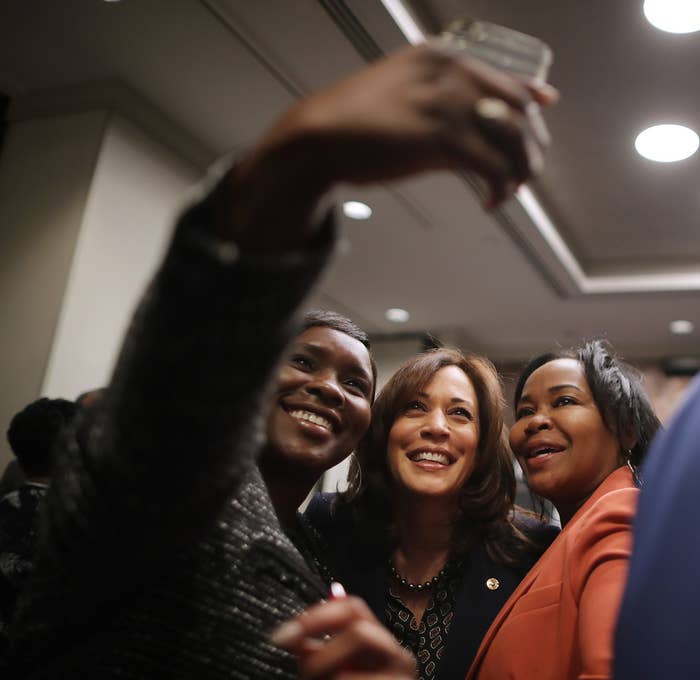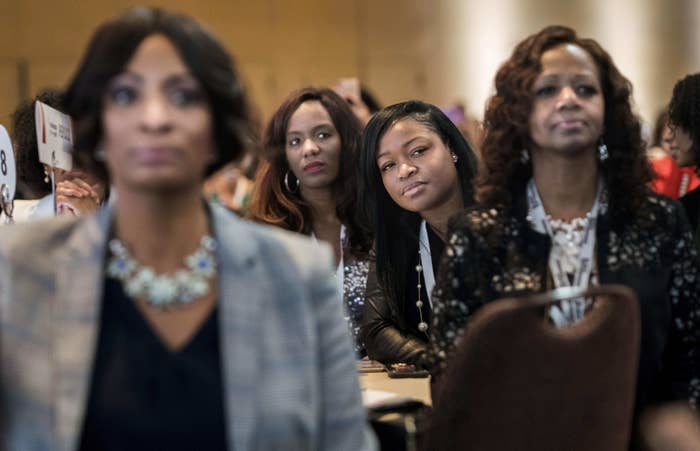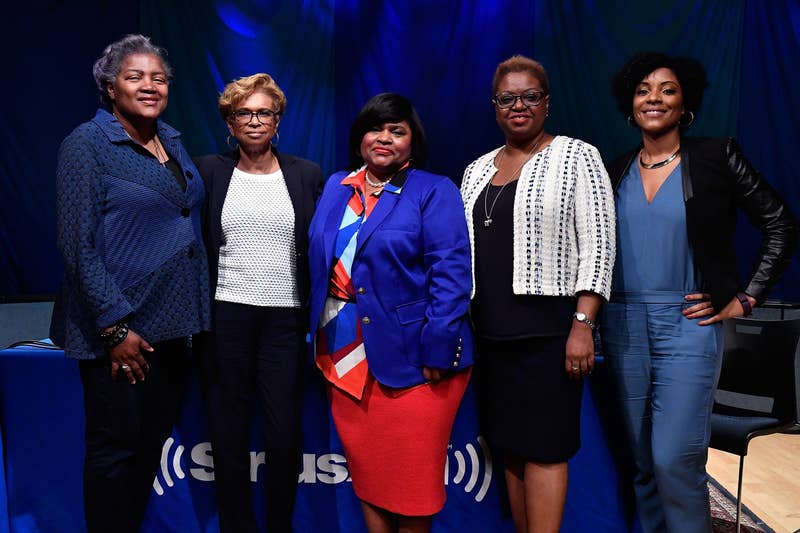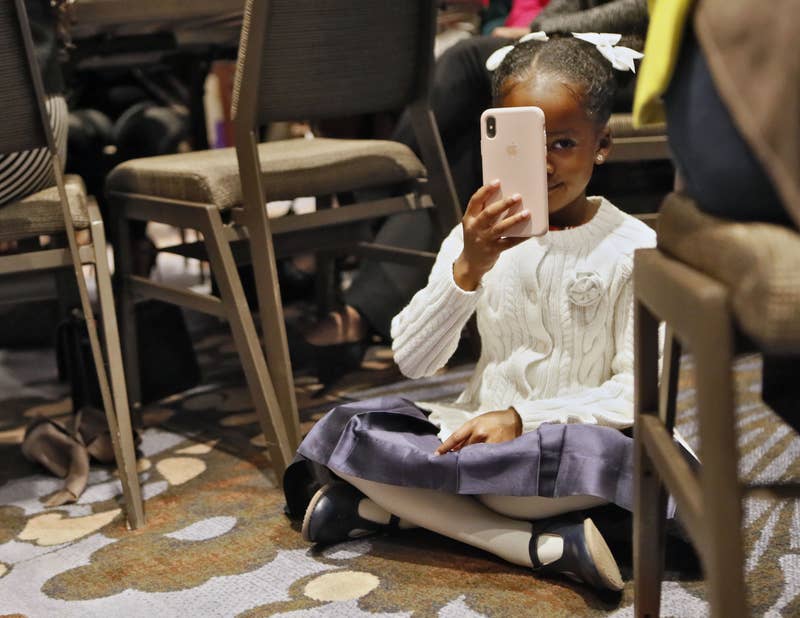“You do not understand how much this means for us,” a longtime Democratic official said of Biden picking Kamala Harris as his running mate.
Molly Hensley-ClancyBuzzFeed News Reporter
Posted on August 12, 2020

Chip Somodevilla / Getty Images
Sen. Kamala Harris poses for a selfie during an event in Washington, DC, Feb. 7, 2019.
At 4:15 p.m. on Tuesday, Yolanda Caraway was sitting at her desk, smiling as the notifications lit up faster than she could read them. “‘This is the first thing that’s lifting my mood in four months.’ ‘So excited I can’t stand it!’ ‘Howard University all the way.’ ‘’Kamala! Kamala!! Kamala!!!’”
The emails came one after the other, many from Black political leaders who, just like Caraway, have seen the Democratic Party through decades of change and transformation, but were left breathless and elated by Tuesday’s news. “You do not understand how much this means for us,” she said that night. “The emails are still coming.”
Karen Carter Peterson’s phone was blowing up, too. The first thing she did was tap out a text to her family group chat. There were aunts, uncles, cousins, siblings on the thread — but it was a message of gratitude, she said, sent especially for her mother. “Happy to celebrate this with my Mom who sacrificed so much for my education at @HowardU and my public service,” wrote Carter Peterson, a Democratic Party officer and the departing chair of the Louisiana state party. “Heartfelt gratitude to all who helped us get to this moment.”
Minyon Moore was at the dining room table she uses as a desk when the call came. “And I just sat with that for a minute. I just sat there. And then I found, out of nowhere, just tears coming down — like they are now,” she said in a phone call on Tuesday night, before ticking off the names that came next to mind. “I thought about Betty Shabazz. I thought about Coretta Scott King. I thought about Maya Angelou. I thought about Dorothy Height. And I thought about everything that they have poured into us.”
Moore, a 62-year-old veteran political operative who, alongside Caraway and others, helped pave the way for Black women to become the institutional backbone of the Democratic Party, laughed as she came to the end of her list. “And then it took Joe Biden to say, ‘It’s time to come out from the shadows.’ To say, ‘I see you.’ He saw her. He saw her qualifications despite all the negative stuff that was being thrown at her,” Moore said. “He made history, but I think he will never know how much history he has made.”
The countless texts and emails and video calls that flew back and forth on Tuesday night, connecting Black women across the Democratic Party in the middle of both a pandemic and a time of deep pain and anger over racism and police violence in America, reflect the emotional weight and release of Joe Biden’s selection of the first Black woman on the presidential ticket for any major party, Sen. Kamala Harris.
Harris, a 55-year-old former attorney general of California, a daughter of Indian and Jamaican immigrants, and a graduate of the leading historically Black college Howard University, will make history for both Black women and people of South Asian descent when her name appears as the Democratic vice presidential nominee on ballots this fall.
For the operatives, candidates, and activists who see something of themselves in a person like Harris, Tuesday hit as something more personal and communal — almost familial — than a piece of political news.
One of the first people that Moore called was Leah Daughtry, another longtime official who has worked for the party since the ’80s. “And then we were crying together,” said Daughtry. When she hung up the phone, she sat alone in her office — “and I wept,” Daughtry said, thinking of her grandmother, raised in the segregated South; thinking of her own role in the party — “opening doors, making room at the table, ‘bringing a folding chair,’ as Shirley Chisholm would say” — and of “all the threads of my life wound into one, to see this Black woman on the ticket, it's an amazing moment.”

Melina Mara / The Washington Post via Getty Images
A packed room full of women of color listen to Harris during the Black Enterprise Women of Power Summit in Las Vegas, Nevada, March 1, 2019.
Harris’s presidential campaign last year leaned into that history: Her bright yellow, red, and blue logo evoked the political buttons worn by Chisholm in her 1972 presidential run, and on the campaign trail, she spoke regularly of her parents, who met in the civil rights movement in Oakland. But she also struggled to make inroads with Black voters, including Black women. After her campaign zeroed in initially on South Carolina, where Democratic primary voters are overwhelmingly Black, she pivoted to mostly white Iowa.
In March, Harris spoke about the challenges of running as a Black woman, especially with a mostly white press corps who, she said, treated her differently than white candidates and could miss things like the significance of a Black institution like Alpha Kappa Alpha, the historically Black sorority Harris joined at Howard.
“If you don’t notice the shine in the little Black girl’s eyes because you don’t look in their eyes, you’re not going to write about that,” she said this spring.
By then, the historically diverse slate of presidential candidates in the Democratic primary had winnowed to two white men in their late seventies, Biden and Sen. Bernie Sanders — a moment of reckoning for some Democrats.
Across the country, though, a historic number of Black women are now running for office in 2020: more than 120, according to an estimate by the Center for American Women and Politics.
In her 5-year-old daughter’s room, Jennifer McClellan, a state senator and gubernatorial candidate in Virginia, jumped to her feet when she heard the news about Harris, shouting, “Yes!” Immediately, McClellan picked up the phone and made calls: first to Carter Peterson, who also serves as a vice chair of the Democratic National Committee, then to Shavonda Sumter, a state legislator in New Jersey, followed by texts to Ramesh Akbari, a legislator in Tennessee.
When she first heard Biden’s decision, McClellan said, she tried not to cry. But she teared up as she spoke about it later: “It’s just — I’m just proud. I’m just very proud.”
Pam Keith, a Florida Democrat running for a House seat, was a member of Alpha Kappa Alpha in the same generation as Harris. On Tuesday, Keith’s group text buzzed with her sisters in AKA, including some who had not been active in the sorority in years. Keith felt “massively giddy” with excitement.
But she also felt relief.
“No matter what you are, as a Black woman, in politics, in leadership, in authority, you’re not quite the right kind of Black woman,” Keith said — something, she noted, that never happens to white men.
“To see Kamala having gone through the presidential primary and taken so many slings and arrows and insults for being the wrong kind of Black woman — to see someone with the visibility and respect and power of Joe Biden say, ‘No, Kamala is exactly the right kind of Black woman. She’s herself, and that’s exactly right.’ That’s a kind of validation that we seldom get when we walk this path. And that’s really relieving. And giddy. Just, massively giddy.”

Larry French / Getty Images
Donna Brazile, Yolanda Caraway, Minyon Moore, Leah Daughtry, and host Zerlina Maxwell at SiriusXM Studio in Washington, DC, March 28, 2017.
Many of the Democratic operatives interviewed for this article were part of an early and coordinated push by Black women to influence Biden’s search and defend the top contenders through the vetting process. Harris was one of about six Black women under consideration for the job, alongside former Georgia gubernatorial candidate Stacey Abrams, California Rep. Karen Bass, Atlanta Mayor Keisha Lance Bottoms, Florida Rep. Val Demings, and former national security adviser Susan Rice. The women faced a barrage of opposition research and, at points, blatant racism and sexism.
Last week, more than 100 Black women leaders organized an open letter pushing back against depictions of the possible vice presidential nominees as too “ambitious” or lacking “remorse.” One comment, a Facebook post from a small-town mayor in Virginia who referred to Biden’s prospective pick as “Aunt Jemima,” was the “straw that broke the camel’s back,” said Caraway, the longtime political operative who served as a DNC member for about two decades.
“No matter who you are supporting for vice president,” the open letter read, “you should be equally outraged by the blatant disrespect of Black women.”
“We came together as a group and made a stand,” said Moore. “When you have a mayor that is calling you ‘Aunt Jemima,’ you can't just let that go idly by. The thing that I regret the most is that we did not stand up for Hillary. We voted for her. But we did not stand up.”
Earlier this spring, a group of Black women met virtually with Biden and his staff to express the importance of representation on the ticket.
About a month ago, a smaller group including Daughtry and Moore met again with Biden’s vice presidential search committee — this time to express their preference specifically for Harris, according to three people familiar with the meeting. (Moore and Daughtry declined to comment on the details of their talks with the committee.)
In interviews on Tuesday night, Black women described Harris’s nomination as a marker affixed between past and future. They sent around old videos of Shirley Chisholm, and they quoted Maya Angelou: “Each time a woman stands up for herself, without knowing it possibly, without claiming it, she stands up for all women.”
For many, these were messages intended for the next generation. About a week ago, Daughtry said, she told one of the only young women in her family, a 3-year-old niece named Lauren Joy, that she was spending her days and nights working to get a Black woman on the ticket, “so that next year she will grow up only ever knowing a vice president to be a Black woman.”
Donna Brazile, a longtime Democratic party official who has twice served as interim chair of the DNC, got the news early, and placed a call in secret to a young mentee: Amos Jackson III, a special assistant in Harris’s Senate office who also served as the former student body president at her alma mater, Howard University, class of 2019. “When I told him she had been selected, and that he had to keep it quiet, he just cried,” Brazile said in an interview. “And for me, that summed up what this moment has been.”
Brazile, Daughtry, Caraway, and Moore entered Democratic politics in the 1980s, a time that ushered in Rev. Jesse Jackson’s two presidential campaigns and Ron Brown’s tenure as the first Black chair of the DNC, and helped cement Black women both the party’s longest-serving stewards and most loyal voting bloc every four years. Caraway said she remembers meeting Harris as a young college student at Howard University, when her roommate was a volunteer on Walter Mondale’s 1984 presidential campaign. “I was like a big sister to her,” Caraway said on Tuesday.
They also know well the singular challenge that Harris will face in her new role, with the burden of so many firsts on her back while running against a president who has frequently demeaned his opponents with racist and sexist attacks.
In his first comments about Biden’s new vice presidential nominee on Tuesday night, President Trump repeatedly referred to Harris as “nasty,” a word he’s frequently used for years to describe women with whom he is in conflict.
“Historically, the attacks on women, and particularly Black women, are well-documented,” said Joyce Elliott, a legislator running for a House seat in Arkansas. “I’ve felt that pain myself. But I’ve tried to channel it, and hoped that that’s going to be helpful to move the needle for women that come after me.”
Keith, the House candidate in Florida, said she knows the likelihood that Harris will be subject to attacks rooted in sexism and misogyny. But she’s not worried.
“It’s nothing she hasn’t dealt with before,” said Keith. “But second of all, she has got an army of the most ferocious Black women backing her. The people who are going to come at her with their kitchen knives ain’t got nothing on us.” ●

Bob Andres / AP
A young girl sits on the floor during a Kamala Harris campaign event in Iowa.
CORRECTION
August 12, 2020, at 9:15 a.m.
Caraway met Kamala Harris when her roommate was working on the 1984 presidential campaign. A previous version of this story misstated how they met.
MORE ON KAMALA HARRIS
Trump's Attempted Attacks On Kamala Harris Are All Over The Place
Posted on August 12, 2020

Chip Somodevilla / Getty Images
Sen. Kamala Harris poses for a selfie during an event in Washington, DC, Feb. 7, 2019.
At 4:15 p.m. on Tuesday, Yolanda Caraway was sitting at her desk, smiling as the notifications lit up faster than she could read them. “‘This is the first thing that’s lifting my mood in four months.’ ‘So excited I can’t stand it!’ ‘Howard University all the way.’ ‘’Kamala! Kamala!! Kamala!!!’”
The emails came one after the other, many from Black political leaders who, just like Caraway, have seen the Democratic Party through decades of change and transformation, but were left breathless and elated by Tuesday’s news. “You do not understand how much this means for us,” she said that night. “The emails are still coming.”
Karen Carter Peterson’s phone was blowing up, too. The first thing she did was tap out a text to her family group chat. There were aunts, uncles, cousins, siblings on the thread — but it was a message of gratitude, she said, sent especially for her mother. “Happy to celebrate this with my Mom who sacrificed so much for my education at @HowardU and my public service,” wrote Carter Peterson, a Democratic Party officer and the departing chair of the Louisiana state party. “Heartfelt gratitude to all who helped us get to this moment.”
Minyon Moore was at the dining room table she uses as a desk when the call came. “And I just sat with that for a minute. I just sat there. And then I found, out of nowhere, just tears coming down — like they are now,” she said in a phone call on Tuesday night, before ticking off the names that came next to mind. “I thought about Betty Shabazz. I thought about Coretta Scott King. I thought about Maya Angelou. I thought about Dorothy Height. And I thought about everything that they have poured into us.”
Moore, a 62-year-old veteran political operative who, alongside Caraway and others, helped pave the way for Black women to become the institutional backbone of the Democratic Party, laughed as she came to the end of her list. “And then it took Joe Biden to say, ‘It’s time to come out from the shadows.’ To say, ‘I see you.’ He saw her. He saw her qualifications despite all the negative stuff that was being thrown at her,” Moore said. “He made history, but I think he will never know how much history he has made.”
The countless texts and emails and video calls that flew back and forth on Tuesday night, connecting Black women across the Democratic Party in the middle of both a pandemic and a time of deep pain and anger over racism and police violence in America, reflect the emotional weight and release of Joe Biden’s selection of the first Black woman on the presidential ticket for any major party, Sen. Kamala Harris.
Harris, a 55-year-old former attorney general of California, a daughter of Indian and Jamaican immigrants, and a graduate of the leading historically Black college Howard University, will make history for both Black women and people of South Asian descent when her name appears as the Democratic vice presidential nominee on ballots this fall.
For the operatives, candidates, and activists who see something of themselves in a person like Harris, Tuesday hit as something more personal and communal — almost familial — than a piece of political news.
One of the first people that Moore called was Leah Daughtry, another longtime official who has worked for the party since the ’80s. “And then we were crying together,” said Daughtry. When she hung up the phone, she sat alone in her office — “and I wept,” Daughtry said, thinking of her grandmother, raised in the segregated South; thinking of her own role in the party — “opening doors, making room at the table, ‘bringing a folding chair,’ as Shirley Chisholm would say” — and of “all the threads of my life wound into one, to see this Black woman on the ticket, it's an amazing moment.”

Melina Mara / The Washington Post via Getty Images
A packed room full of women of color listen to Harris during the Black Enterprise Women of Power Summit in Las Vegas, Nevada, March 1, 2019.
Harris’s presidential campaign last year leaned into that history: Her bright yellow, red, and blue logo evoked the political buttons worn by Chisholm in her 1972 presidential run, and on the campaign trail, she spoke regularly of her parents, who met in the civil rights movement in Oakland. But she also struggled to make inroads with Black voters, including Black women. After her campaign zeroed in initially on South Carolina, where Democratic primary voters are overwhelmingly Black, she pivoted to mostly white Iowa.
In March, Harris spoke about the challenges of running as a Black woman, especially with a mostly white press corps who, she said, treated her differently than white candidates and could miss things like the significance of a Black institution like Alpha Kappa Alpha, the historically Black sorority Harris joined at Howard.
“If you don’t notice the shine in the little Black girl’s eyes because you don’t look in their eyes, you’re not going to write about that,” she said this spring.
By then, the historically diverse slate of presidential candidates in the Democratic primary had winnowed to two white men in their late seventies, Biden and Sen. Bernie Sanders — a moment of reckoning for some Democrats.
Across the country, though, a historic number of Black women are now running for office in 2020: more than 120, according to an estimate by the Center for American Women and Politics.
In her 5-year-old daughter’s room, Jennifer McClellan, a state senator and gubernatorial candidate in Virginia, jumped to her feet when she heard the news about Harris, shouting, “Yes!” Immediately, McClellan picked up the phone and made calls: first to Carter Peterson, who also serves as a vice chair of the Democratic National Committee, then to Shavonda Sumter, a state legislator in New Jersey, followed by texts to Ramesh Akbari, a legislator in Tennessee.
When she first heard Biden’s decision, McClellan said, she tried not to cry. But she teared up as she spoke about it later: “It’s just — I’m just proud. I’m just very proud.”
Pam Keith, a Florida Democrat running for a House seat, was a member of Alpha Kappa Alpha in the same generation as Harris. On Tuesday, Keith’s group text buzzed with her sisters in AKA, including some who had not been active in the sorority in years. Keith felt “massively giddy” with excitement.
But she also felt relief.
“No matter what you are, as a Black woman, in politics, in leadership, in authority, you’re not quite the right kind of Black woman,” Keith said — something, she noted, that never happens to white men.
“To see Kamala having gone through the presidential primary and taken so many slings and arrows and insults for being the wrong kind of Black woman — to see someone with the visibility and respect and power of Joe Biden say, ‘No, Kamala is exactly the right kind of Black woman. She’s herself, and that’s exactly right.’ That’s a kind of validation that we seldom get when we walk this path. And that’s really relieving. And giddy. Just, massively giddy.”

Larry French / Getty Images
Donna Brazile, Yolanda Caraway, Minyon Moore, Leah Daughtry, and host Zerlina Maxwell at SiriusXM Studio in Washington, DC, March 28, 2017.
Many of the Democratic operatives interviewed for this article were part of an early and coordinated push by Black women to influence Biden’s search and defend the top contenders through the vetting process. Harris was one of about six Black women under consideration for the job, alongside former Georgia gubernatorial candidate Stacey Abrams, California Rep. Karen Bass, Atlanta Mayor Keisha Lance Bottoms, Florida Rep. Val Demings, and former national security adviser Susan Rice. The women faced a barrage of opposition research and, at points, blatant racism and sexism.
Last week, more than 100 Black women leaders organized an open letter pushing back against depictions of the possible vice presidential nominees as too “ambitious” or lacking “remorse.” One comment, a Facebook post from a small-town mayor in Virginia who referred to Biden’s prospective pick as “Aunt Jemima,” was the “straw that broke the camel’s back,” said Caraway, the longtime political operative who served as a DNC member for about two decades.
“No matter who you are supporting for vice president,” the open letter read, “you should be equally outraged by the blatant disrespect of Black women.”
“We came together as a group and made a stand,” said Moore. “When you have a mayor that is calling you ‘Aunt Jemima,’ you can't just let that go idly by. The thing that I regret the most is that we did not stand up for Hillary. We voted for her. But we did not stand up.”
Earlier this spring, a group of Black women met virtually with Biden and his staff to express the importance of representation on the ticket.
About a month ago, a smaller group including Daughtry and Moore met again with Biden’s vice presidential search committee — this time to express their preference specifically for Harris, according to three people familiar with the meeting. (Moore and Daughtry declined to comment on the details of their talks with the committee.)
In interviews on Tuesday night, Black women described Harris’s nomination as a marker affixed between past and future. They sent around old videos of Shirley Chisholm, and they quoted Maya Angelou: “Each time a woman stands up for herself, without knowing it possibly, without claiming it, she stands up for all women.”
For many, these were messages intended for the next generation. About a week ago, Daughtry said, she told one of the only young women in her family, a 3-year-old niece named Lauren Joy, that she was spending her days and nights working to get a Black woman on the ticket, “so that next year she will grow up only ever knowing a vice president to be a Black woman.”
Donna Brazile, a longtime Democratic party official who has twice served as interim chair of the DNC, got the news early, and placed a call in secret to a young mentee: Amos Jackson III, a special assistant in Harris’s Senate office who also served as the former student body president at her alma mater, Howard University, class of 2019. “When I told him she had been selected, and that he had to keep it quiet, he just cried,” Brazile said in an interview. “And for me, that summed up what this moment has been.”
Brazile, Daughtry, Caraway, and Moore entered Democratic politics in the 1980s, a time that ushered in Rev. Jesse Jackson’s two presidential campaigns and Ron Brown’s tenure as the first Black chair of the DNC, and helped cement Black women both the party’s longest-serving stewards and most loyal voting bloc every four years. Caraway said she remembers meeting Harris as a young college student at Howard University, when her roommate was a volunteer on Walter Mondale’s 1984 presidential campaign. “I was like a big sister to her,” Caraway said on Tuesday.
They also know well the singular challenge that Harris will face in her new role, with the burden of so many firsts on her back while running against a president who has frequently demeaned his opponents with racist and sexist attacks.
In his first comments about Biden’s new vice presidential nominee on Tuesday night, President Trump repeatedly referred to Harris as “nasty,” a word he’s frequently used for years to describe women with whom he is in conflict.
“Historically, the attacks on women, and particularly Black women, are well-documented,” said Joyce Elliott, a legislator running for a House seat in Arkansas. “I’ve felt that pain myself. But I’ve tried to channel it, and hoped that that’s going to be helpful to move the needle for women that come after me.”
Keith, the House candidate in Florida, said she knows the likelihood that Harris will be subject to attacks rooted in sexism and misogyny. But she’s not worried.
“It’s nothing she hasn’t dealt with before,” said Keith. “But second of all, she has got an army of the most ferocious Black women backing her. The people who are going to come at her with their kitchen knives ain’t got nothing on us.” ●

Bob Andres / AP
A young girl sits on the floor during a Kamala Harris campaign event in Iowa.
CORRECTION
August 12, 2020, at 9:15 a.m.
Caraway met Kamala Harris when her roommate was working on the 1984 presidential campaign. A previous version of this story misstated how they met.
MORE ON KAMALA HARRIS
Trump's Attempted Attacks On Kamala Harris Are All Over The Place
Kadia Goba · Aug. 12, 2020
Kamala Harris Is Joe Biden's Pick For Vice President
Kamala Harris Is Joe Biden's Pick For Vice President
Henry J. Gomez · Aug. 11, 2020

Ruby Cramer is a politics reporter for BuzzFeed News and is based in New York.

Molly Hensley-Clancy is a politics reporter for BuzzFeed News and is based in Washington, DC.

Ruby Cramer is a politics reporter for BuzzFeed News and is based in New York.

Molly Hensley-Clancy is a politics reporter for BuzzFeed News and is based in Washington, DC.
No comments:
Post a Comment